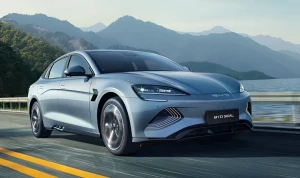GST 2.0 Sparks Major Price Cuts: Lexus Cars Now Cheaper By Up To ₹20.8 Lakh
- Luxury car prices drop sharply with the introduction of GST 2.0
- Price cuts range from ₹1.47 lakh to ₹20.8 lakh across different models

India’s automobile sector has entered a new chapter with the launch of GST 2.0. The revised tax system is designed to simplify the earlier multi-layered structure and to lower the cost of ownership for buyers.
Under the previous system, luxury cars were taxed at 28% GST plus an additional compensation cess of up to 22%, which made high-end vehicles extremely expensive. GST 2.0 has now replaced this with a flat 40% GST rate on all premium cars.
This single tax rate has made luxury models more affordable, as automakers are now passing on the full benefit to customers.
Catch the latest launches and updates on CarOnPhone!What Are The New GST Tax Slabs?
The new GST tax slab under GST 2.0 has simplified the structure for automobiles. Earlier, buyers had to pay 28% GST plus a variable cess that could go as high as 22% for larger luxury vehicles. Now, this system has been replaced by a single flat rate.
New GST Rates For Automobiles:
| Vehicle Category | Old GST Rate (GST + Cess) | New GST Rate under GST 2.0 |
|---|---|---|
| Small Cars (under 4m, ≤1200cc petrol) | 28% | 18% |
| Mid-size Cars (under 4m, ≤1500cc diesel) | 28% | 18% |
| SUVs and Large Luxury Cars | 28% + 22% cess (50%) | 40% |
| Electric Vehicles | 5% | 5% |
This major tax reform has encouraged premium carmakers to pass on the full savings directly to customers.
Lexus India Announces Price Reductions
In line with other global luxury brands operating in India, Lexus India has announced price cuts across its full portfolio. The revised pricing will take effect from September 22, 2025, the same date the GST 2.0 tax structure officially comes into force nationwide.
The reductions vary by model, but the most dramatic drop is seen on the flagship SUV.
Lexus Cars New Pricing After GST Cut
| Model | Price Reduction (₹) |
|---|---|
| ES 300h | 1.47 lakh |
| NX 350h | 1.58 lakh |
| RX 350h | 2.10 lakh |
| RX 500h | 2.58 lakh |
| LM 350h | 5.77 lakh |
| LX 500d | 20.8 lakh |
This clearly shows how GST 2.0 benefits both entry-level luxury buyers and those looking at flagship SUVs.
Lexus India’s Market Strategy
Lexus entered the Indian automobile industry in 2017 and currently sells a five-model lineup, with four of them being self-charging hybrid electric vehicles. The ES 300h sedan remains the brand’s most popular model in India, and it was also the first Lexus to be locally manufactured in the country
The company has highlighted that this move is not just about lowering prices, but also about making luxury mobility more accessible to Indian buyers
Official Statement From Lexus India
Hikaru Ikeuchi, President of Lexus India, expressed gratitude towards the government, calling the GST reform “historic.” He emphasized that:
The full GST benefit will be passed on to customers.
The reform improves affordability and accessibility in the luxury mobility space.
The timing right before the festive season will encourage more customers to experience the Lexus brand.
He also mentioned that the initiative reflects the company’s focus on Omotenashi, a Japanese philosophy of hospitality that anticipates customer needs and ensures meaningful ownership experiences.
Impact On The Automobile Industry
The automobile industry has faced challenges in recent years due to rising input costs and fluctuating demand. However, the implementation of GST 2.0 is expected to:
- Increase sales in the premium car segment
- Encourage more customers to consider luxury SUVs and sedans
- Help luxury automakers compete more strongly with imported models
- Boost festive season demand across metros and urban markets
Industry experts believe that with price cuts of up to ₹20.8 lakh, the luxury car segment could see a revival in growth and stronger competition
Why GST 2.0 Matters For Buyers
For a customer considering a premium car purchase, GST 2.0 offers several advantages
- Direct price cuts lower the initial investment
- Reduced EMIs and financing options become more attractive
- Wider accessibility for those who previously found luxury vehicles out of reach
- Increased resale value as lower taxes make these vehicles more competitive in the secondary market
For instance, a buyer who was planning to invest in a mid-size luxury SUV can now save anywhere between ₹2 lakh to ₹5 lakh, while flagship SUV buyers save as much as ₹20.8 lakh
Looking Ahead
With new GST rates in place, the premium car industry is expected to witness
- Stronger sales during the festive season of 2025
- More competitive offers from luxury brands to attract customers
- Growth in hybrid and SUV sales as buyers shift to eco-friendly and spacious models
The rollout of GST 2.0 is not just a tax reform it is also a game changer for luxury mobility in India
The price cuts announced by Lexus India ranging from ₹1.47 lakh on the ES 300h to ₹20.8 lakh on the LX 500d, are a direct result of the new GST tax slab. By passing on the entire benefit of GST 2.0 to customers the company has set a strong example for transparency and customer focus in the luxury car space
For buyers, this is a rare opportunity to own a premium vehicle at significantly reduced prices. For the automobile industry GST 2.0 could be the much-needed boost to revive demand and reshape India’s premium car market
Tags:
CarOnPhone is your one-stop destination to see all upcoming cars, latest cars, released cars, and EV Cars, and compare Cars in all Car Brands. Stay tuned and follow us to update yourself on the automotive world.











